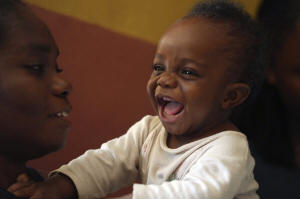Hardest-hit Nigeria is latest African country to provide malaria vaccine
to young children
 Send a link to a friend
Send a link to a friend
 [December 12, 2024]
By CHINEDU ASADU and DAN IKPOYI [December 12, 2024]
By CHINEDU ASADU and DAN IKPOYI
BAYELSA, Nigeria (AP) — Ominike Marvis has lost count of the number of
times her 6-year-old son has had malaria. So when Nigeria started
offering a malaria vaccine, she was eager to protect her youngest child.
She took the 6-month-old baby to get his first shot at a health center
in hard-hit Bayelsa state, where the country's vaccination campaign
kicked off last week. The vaccine aims to prevent severe illnesses and
deaths from the mosquito-borne disease.
“At least I know he’s safe from it now,” Marvis, 31, said.
Africa accounts for the vast majority of malaria in the world. Nigeria,
the continent's most populous country, has the biggest burden with about
a quarter of the cases.
According to a World Health Organization report released Wednesday,
there were an estimated 263 million cases of malaria and 597,000 deaths
worldwide last year, mostly in children under 5. That is 11 million more
malaria cases compared to 2022 with nearly the same number of deaths.
“No one should die of malaria, yet the disease continues to
disproportionately harm people living in the African region, especially
young children and pregnant women,” said WHO Director-General Tedros
Adhanom Ghebreyesus, calling for more support.

There are now 17 countries giving new malaria vaccines to young
children, the WHO report said. Nigeria began its campaign last week,
offering a vaccine developed by Oxford University.
Research suggests it is more than 75% effective at preventing severe
disease and death in the first year and that protection is extended for
at least another year with a booster.
Nigeria’s health minister, Muhammad Ali Pate, called the vaccination
campaign a “monumental step” in the country’s efforts to eliminate
malaria.
[to top of second column]
|

A woman waits for her child to be administered the malaria vaccine
R21/Matrix-M at the comprehensive Health Centre in Agudama-Epie, in
Yenagoa, Nigeria, Monday, Dec. 9, 2024. (AP Photo/Sunday Alamba)
 The disease is caused by a parasite
that is spread through mosquito bites. Experts say other measures
like bed nets and insecticide spraying remain essential to curb the
disease.
Experts say Nigeria's population of more than 210 million people, as
well as its climate, contribute to its high malaria burden, but so
do other factors like poor sanitation and limited tools like treated
bed nets.
Besides the lack of funding, WHO report said countries with malaria
still grapple with fragile health systems, weak surveillance and
drug and insecticide resistance.
But progress has also been made on several fronts, the report said,
including in the African region where countries have achieved a 16%
reduction in malaria deaths since 2015. And in 83 countries where
malaria is present, 25 of them now report fewer than 10 cases a
year, the report said.
In the oil-rich but poor Bayelsa state, among the worst-hit in
Nigeria, malaria is so common in riverside communities that mothers
spoke of how no one in their family has been spared.
“Here, malaria is something we are used to,” said Claris Okah, a
community health worker.
Among the challenges health workers like Okah face is hesitancy
among parents, so they are educating families about the new vaccine
and other steps to prevent malaria.
“The vaccine is a good thing," Okah siad.
___
Asadu reported from Abuja, Nigeria.
All contents © copyright 2024 Associated Press. All rights reserved |